One of my tips for decluttering living rooms is featured in the Redfin blog! 19 Must-Read Storage Hacks for a Cluttered Home. You’ll find my insights in Tip 17: Involve Your Family.
And here are some EXTRA tips to keep your living room looking neat!
1. The Clutter Buster

Here’s one creative idea I used in my family of 4 children. When the house started looking cluttered—which it often did—I would warn them ahead of time that we’d be doing a cleanup and give them some transition time. Then we started a 10 to 15-minute clutter buster. I asked everyone to stop what they were doing, pick up 10 things and put them away. It’s amazing how much better your house looks when 40 items of clutter get picked up! You can also use a timer so it’s a race against the clock.
2. Maintaining a tidy living room
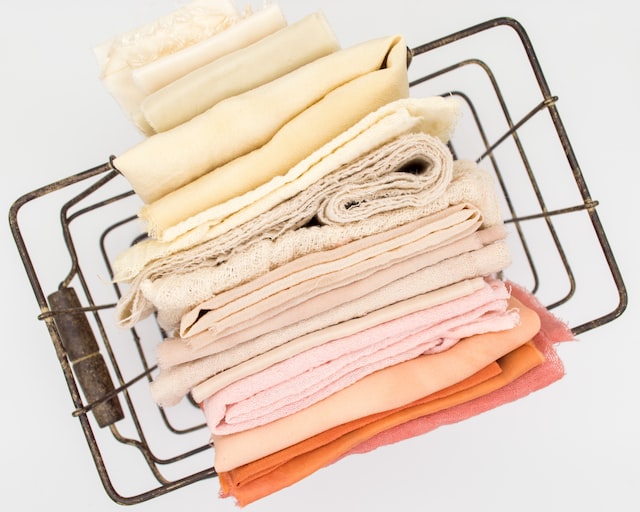
In the living room especially, blankets, magazines, electronics (and cords) and gaming devices become an issue. One thing that bothers me is how messy the blankets look when strewn haphazardly over the couches.
An easy solution for a tidy living room is to get a large, attractive basket, then fold & put away the blankets every night. That way, at least the living room stays neat all day, until family time the next evening! It takes regular decluttering to keep up with the chaos.
3. Cords, Cords, Cords!
Cords are such an eyesore. I especially detest black cords cluttering my living room. So, I went to an organizing store and bought a small grey bin that fits a power strip, and a couple game controllers with room for coiled up cords. It works well and looks MUCH better.
Another solution is to get a cord “tube” (it looks like an old-fashioned spiral telephone cord) and channel all your cords through it. They come in a variety of colors, and you can hide them along the baseboard or under the couch. This is a great help in decluttering your living room and making it feel more orderly.
The Redfin blog has a lot of other great tips (besides my own), so I hope you find something that will help you work through your current organizational challenge! And don’t forget to check out my other blogs, which cover topics from holiday shopping to food storage strategies. You’ll find them all on my website, efficientspaces.org.
I’ve been taking some trips in my RV lately, traveling for about a week at a time for Comicons with my husband, a writer. I like traveling! I especially love setting up and organizing a new kitchen with space-saving gadgets. It makes our life on the road easier!
It will make your life easier, too, if you have a small kitchen.
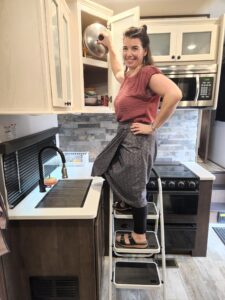
I have some ideas to help you enjoy your small space to the maximum!
Our RV is a forest River Nitro, and one reason we chose this one is the kitchen design. Some RV kitchens have a narrow ‘galley’ kitchen created by the island or peninsula, but we like this open L-shaped footprint for the kitchen cabinets.
To me, the kitchen feels more open this way. The only real disadvantage to this kitchen is the depth of the drawers, which are only 9 ½ deep! I had to improvise because a normal silverware organizer will not fit in my kitchen drawer. I’m sure there are things about your kitchen or apartment that require creative solutions. Read on for some great storage ideas!
But the kitchen in my RV has plenty of storage for food, dishes, pots and pans, etc., as long as you’re willing to get on a stepladder to get to the 2nd shelf.
One way I solved the problem of not being able to reach the back of the cabinet is by adding a large lazy susan. It almost fills the space and allows me to reach three sets of dishes without going on tiptoe. That made it so much more convenient!
The Look Up Principle. A storage idea if you don’t have enough space: whenever this happens look UP to find more space. And by this, I mean: look at your blank walls and even the space above your cabinets. These can be used for seldom-used items like a punch bowl or large vases.
A good general organizing rule-of-thumb is: if you use an item often, it needs to be closer to the hub of action. If you use it infrequently, it can be stored farther away from the action, even in a garage, basement, or attic. Just make sure to label it so you can find it when you need it!
To create a storage system for a kitchen, I always take a look at what I have for cabinets, then figure out a general idea for where to put things. Sometimes that plan is based on the size and shape of the cabinet.
Then I measure each drawer dimensions, including vertical space. I measure each cabinet too. Then I think about what kind of —– I can add to make my space as efficient as possible. To store as much food or kitchen tools as possible.
Either taking a short video or some photos helps with this planning process. Or if you’re really into it, make a sketch of your kitchen and label the drawers and cabinets with the dimensions.
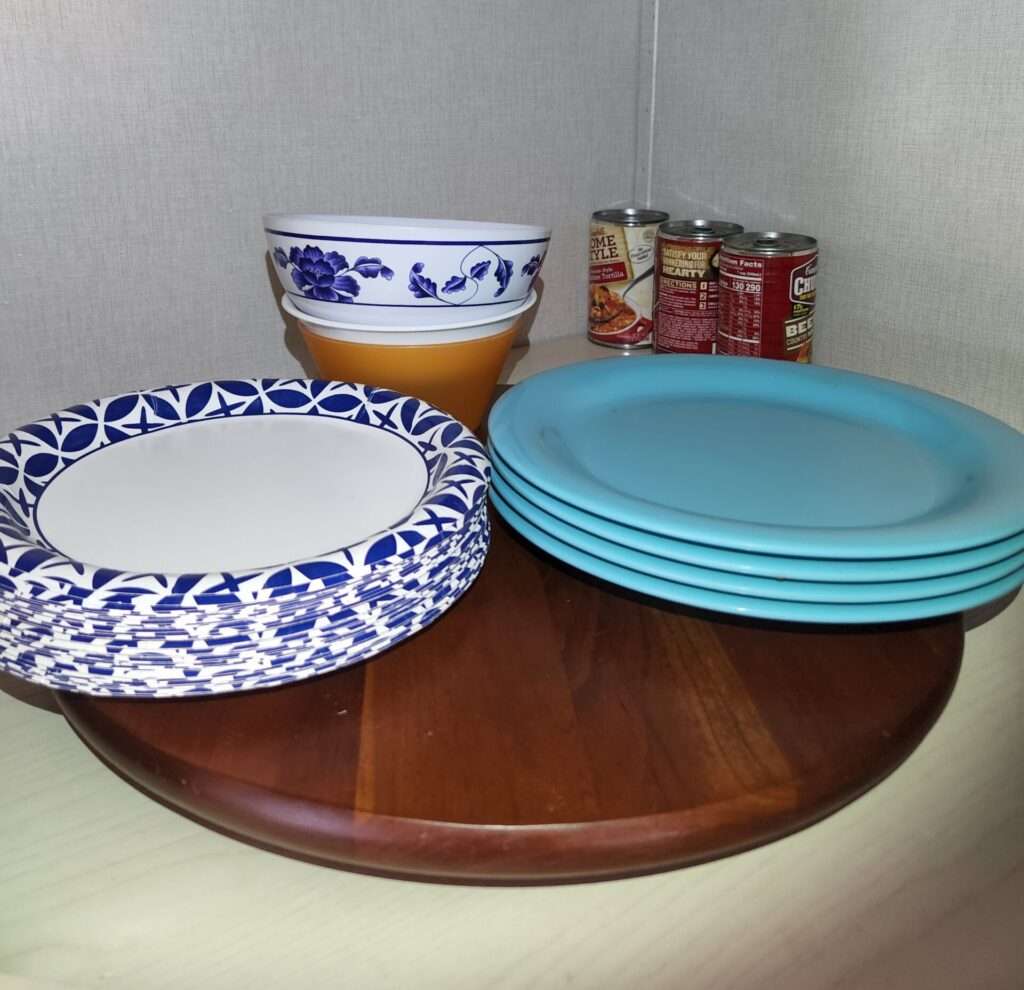
For example, I have a large corner cabinet which is very deep. I can’t reach all the way to the back without climbing on the counter or getting on a stepstool. As I mentioned before, I solved that by adding a large 18-inch lazy Susan, and by putting things in the ‘way’ back that I don’t need to access often (I put some canned food there). By the way, I put bowls, plates, and paper plates on the lazy Susan.
One thing I noticed right away in the camper: there is too much vertical space between the kitchen shelves. And the shelves are not adjustable. My solution for this dilemma is to create a shelf using a wire cabinet shelf. They can hold a surprising amount of weight, and I usually opt for the ones that can stretch to be multiple lengths. Mine stretches from 14 inches to 24 inches long if needed. These are available at organization stores or some big box stores.
If you like a clear counter, you’re going to have to work hard to get it in a small kitchen. One way I do this: hang stuff up instead of using your ‘prime real estate’ counter space. This is part of the Look Up Principle. When you need more storage, look up.
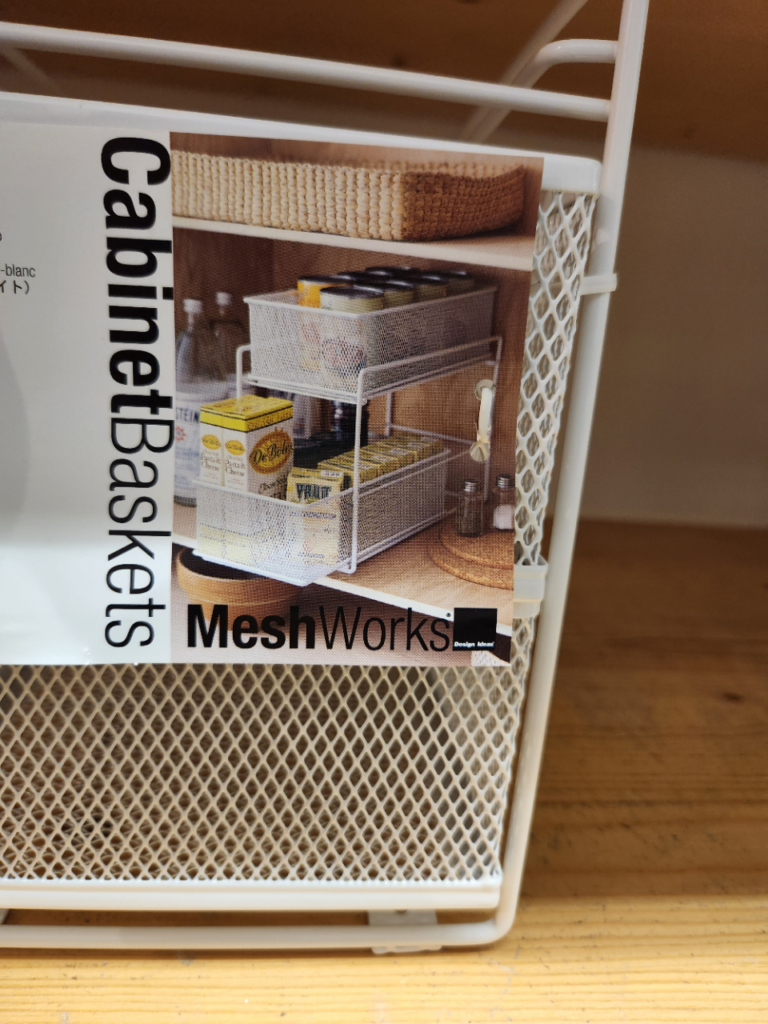
Think double-decker. I have used two-tiered storage under sinks and on counters before. They come in a few different sizes, and most of them slide in & out. Many of them are intended for the fridge, but would work great on a small kitchen counter (or inside a skinny cabinet). Most of them have a chrome framework and 2 plastic drawers. Some are about the size of a dozen eggs, and other units are bigger. It’s a bonus if you can find some with clear or opaque drawers.
Just ask my kids, I love boxes. I especially love clear boxes because they allow you to see what’s inside. You almost don’t need to label them . . . almost. 😉
I have 2 very thin cabinets that aren’t a very useful size. They’re about 8 inches wide each, and again, the vertical distance between shelves is HUGE. The upper shelf is so tall I can only reach the very front of it on tiptoe.
To solve this storage problem, I use 2 narrow clear open-topped boxes. One on the lower shelf and one on the upper shelf. This enables me to easily grab the clear box from the top shelf, retrieve something I need, and put it back.
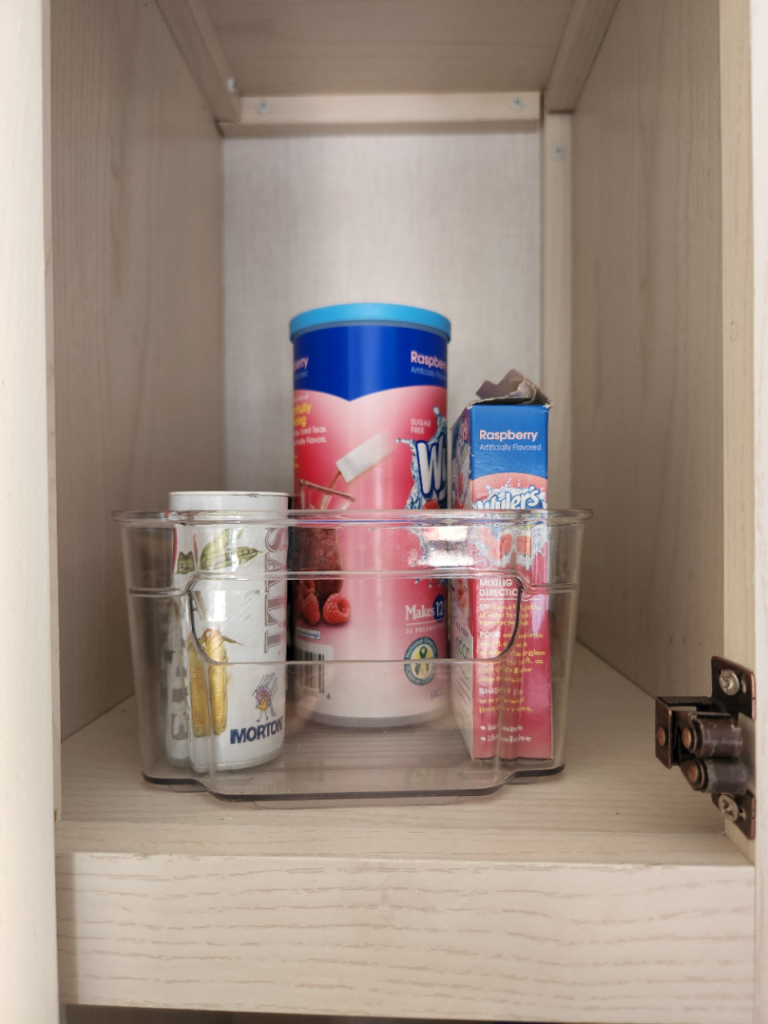
Clear boxes are a great idea for just about everything! you almost don’t need a label.
. . . ALMOST!
Safety Tip: Make sure the one on the high shelf contains things that are light enough for you to easily lift above your head. Canned soup is NOT a good idea, in case one falls on your head while you’re tipping the container to lower it!
Many times, Ross or TJ Maxx will have great prices on organizing products. The only downside is they have a lot of ‘orphans,’ so if you want all your organizing products to match, pick a color or theme and buy only those. (I haven’t found matching containers all at once, I end up piecing my collection together over time.)
I opt for clear or white to have a more uniform look. But your style might be retro colors or black and chrome. Pick a style or color that makes you happy!
With small-space living, in a small apartment, tiny house, or RV, it is especially important to have a plan because space is at such a premium. Don’t just throw a bunch of random stuff in a cabinet and expect it to work. Take time to analyze your space and use it intentionally. Your space will seem bigger when you are organized and things are put away. This will keep you from feeling claustrophobic in your own home
You’ll be much happier with the design and more comfortable too!
How are you handling the pressure of life being back ON? If you’re feeling a bit anxious, overwhelmed, or stuck, this article will help you. I have 7 tips for
Clothes Closets, especially walk-in closets, are a problem area in many homes. If this is you, help is on the way!
Even though I am a professional organizer, I admit, purging my own clothes can be hard!
The problem with closets is they are out of sight, out of mind. No one else sees the master bedroom closet but you, your family, and maybe your cleaning person.
It’s all too easy to let clothes and accessories accumulate over time in your walk-in closet. And before you know it, you are having to shove the hangers in because your clothes are packed as tight as sardines!
One common result of this is that you cannot see or remember what you have.
So, you end up buying duplicate items because you cannot find what you’re looking for.
Which means you’re spending hard-earned money to buy duplicate items! This is especially true for people who have more than one closet where they store clothes and accessories–they forget what they have in the other clothes closet.
And yes, I have had several organizing clients who have 2 or even 3 closets or a room full of clothes!
Before you even get started, it’s a good idea to remind yourself of the WHY, why are you doing this?
(That way, you’ll be in the right mindset to let go.) Next, let’s look at this important question:
What is your WHY?
You are not alone! Thousands of women and men in the US want these things too. Did you know that clutter has a “negative impact on our subjective well-being”? It’s true.
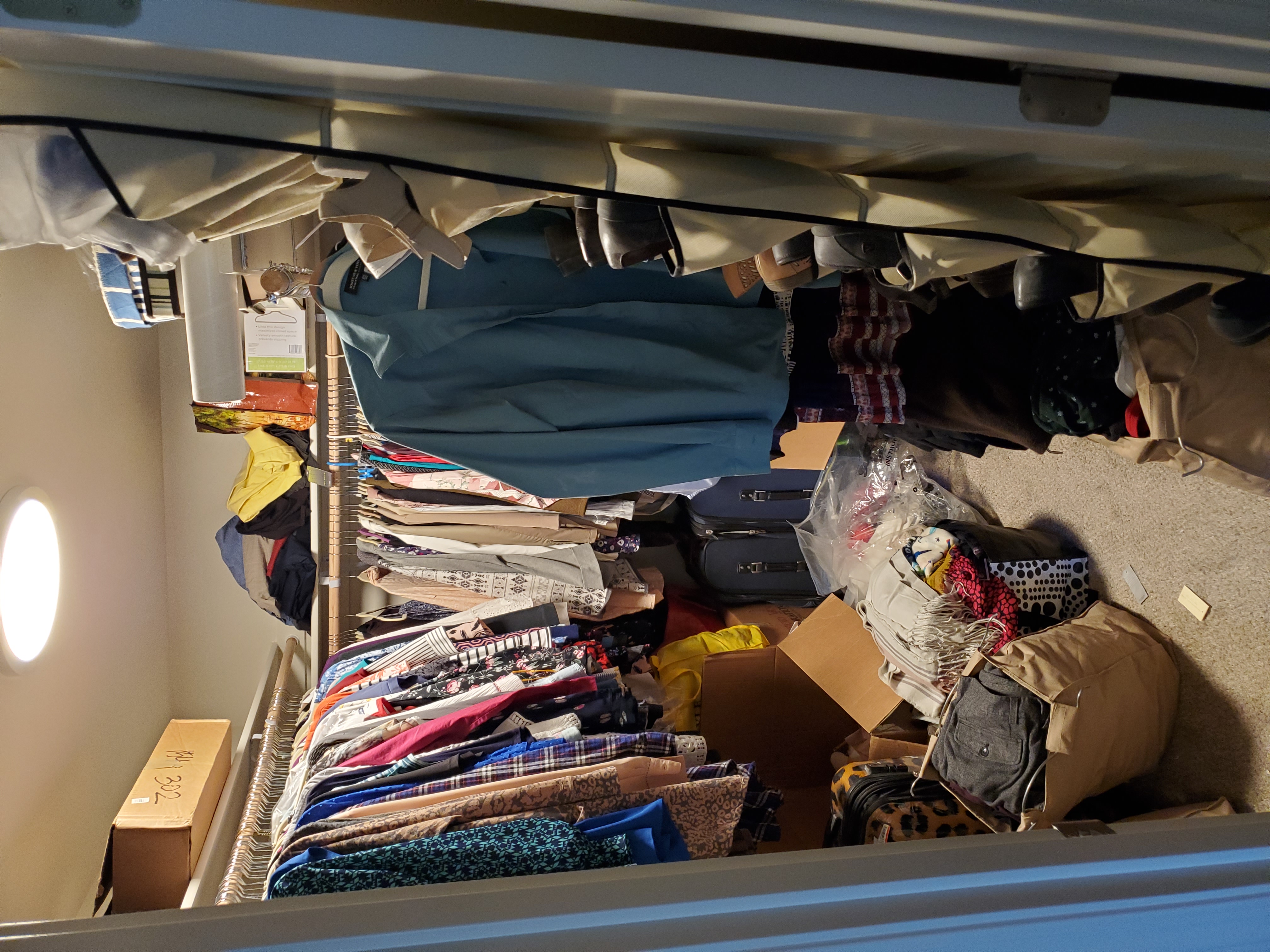
Did you know, messy homes leave us feeling anxious and overwhelmed?
Also, messy homes and workspaces leave us feeling anxious, helpless, and overwhelmed, according to a recent Huffington Post article.
If you’d like to feel better, purging and organizing your packed walk-in closet is the way to go!
It’s time to dig deep and find the strength to let go. Purging your own clothes is hard! So, get yourself into a tough mindset by using the questions in the last section.
In addition, a loving heart can motivate you to purge your clothes. Here’s how.
I promise you’ll have an easier time giving away clothes by visualizing the look of joyful surprise on the face of the person who finds just what they needed at a thrift store (thanks to your generous clothing donation.)
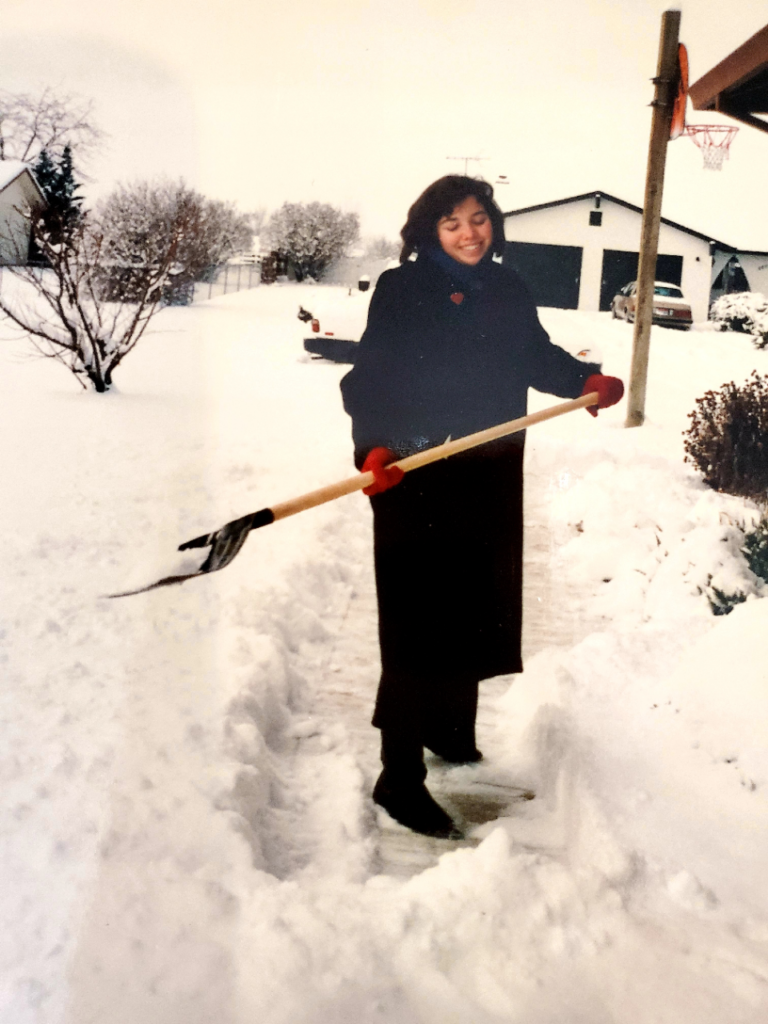
This is me on my mission, shoveling snow & wearing my warm thrift store find!
Circa 1990.
I remember when I was a poor college student in Provo, Utah. I needed a warm dress coat for my upcoming mission. I browsed at TJ Maxx and the coats didn’t look very warm, so I decided to search some thrift stores to find a warm coat. (I had plenty of time, just not much money back then, so I didn’t mind combing the city for a coat!)
I ended up finding a super-warm dress coat that buttoned all the way up and covered my neck—I was so happy! (Most women’s dress coats have a V-neck.) It was constructed of thick black wool, lined with thick black satin, and lasted many years!
So, it will help to picture all the poor or low-income working people who can use some of the clothes you never wear—especially if that motivates you to let go.
The purging phase is the most important part of the closet edit.
I’ve come up with some questions for you to make the process easier. My hope is these questions will help you make good decisions you’ll be happy with.
One caution: Do this when you are in a tough, not a lenient state of mind. If you under-purge, you’ll regret it because you’ll have to do this again in 6 months or live with a packed closet.
That’s a simple yes or no. If it doesn’t fit right now, let it go. In some cases, I do allow a client to keep 1 small box of clothes which are too small. I call it the “skinny pants” box. 🙂
Definitely have a full-length mirror and some good lighting while you try clothing on! There will be some no-brainers here, but some clothes you are going to need to try on. Don’t be daunted. Do it!
Last time I did this with a client, she tried on a whole walk-in closet full of clothes in just two hours, with my help.
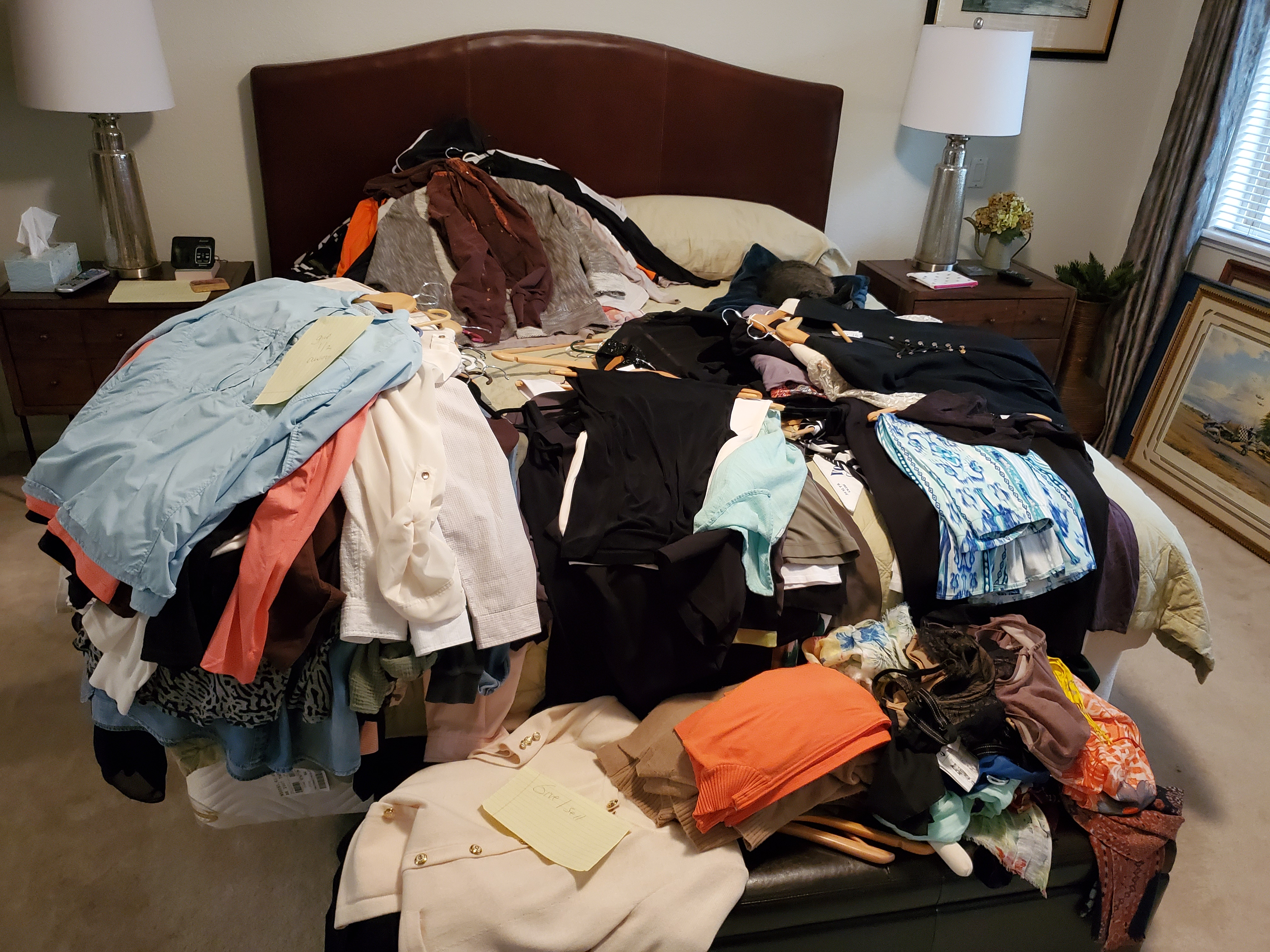
“A woman is never sexier than when she is comfortable in her clothes.” ~Vera Wang
You may have had some great times wearing that sequined dress, but if all your kids have married and you don’t go to swanky New Year’s parties, are you really going to wear it again?
If the answer is an emphatic YES, then keep it. If you’re waffling, or rationalizing why you should keep it, let it go, that’s a nope!
Be sure not to let the cost of the item keep you from letting it go. It won’t do you any good to let that fur coat sit in your walk-in closet taking up prime real estate for the next 10 years.
Sell it if that makes you feel better, but DO take it out of your closet and say goodbye!
The best thing to do, which takes the least amount of time, is to just let go.

I recommend just giving things away so you can move on.
Here’s a caution, though, take care not to make the donation process too difficult, or you won’t do it. For example, some people have 5 bags of stuff going to different friends. That is too complicated, too much work! Much better to take it to one thrift store so those bags don’t clutter up your house for months.
Make it easy on yourself and you’re much more likely to do it.
Be careful not to make up big, unrealistic scenarios for when you might use an item in the future. Example: “I’ll wear this one-piece hot-pink and yellow snowsuit from the 80s if I ever ski again.” See how silly that sounds?
Be brutally honest with yourself in this process of purging and organizing your closet.
As I like to say: be ruthless, not reckless when you purge.
Purging is a MUST to have the pretty, organized closet you desire.
And just think; once you purge all the stuff you never wear, it’s going to be so much easier to find what you want and get ready every morning. Not to mention, much faster!
Best of all, you can dress for work (or play) with a feeling of confidence now that you know everything in your closet makes you look and feel good.
“Why Clutter Can be So Bad for People With Anxiety (And What To Do About It,” Huffington Post, 4/8/2021
The dark side of home: Assessing possession ‘clutter’ on subjective well-being. March 2016, Journal of Environmental Psychology, 46.

Yes, you can make ‘thyme’ for your Vision!
Hi everyone, I’ve been thinking a lot about time lately. Specifically, the VISION I have for this year, and how to make it all happen the way I picture it.
You have some great ideas and plans for 2021 too, and you may be realizing now that we are in mid-February that those goals are taking longer than you thought. At least that’s what I’m running up against.
Not enough TIME is the biggest obstacle that comes between you and your VISION for this year. So many people have told me that finding TIME for goals or working on a new habit is a challenge. Patience and perseverance come into play as well. These qualities that come in handy when pursuing a long-range vision.
So I’m going to show you, using some concepts from my book’s chapter “Fitting in time for Organizing,” how you can consistently make room in your schedule to achieve those awesome goals and plans you made at the beginning of the year!
It doesn’t matter if your goal is organizing or working on a painting every week, these steps will show you how to make time for goals in your schedule.
Regarding the quality of patience, it helps to remind yourself often that projects and tasks usually take longer than you think.
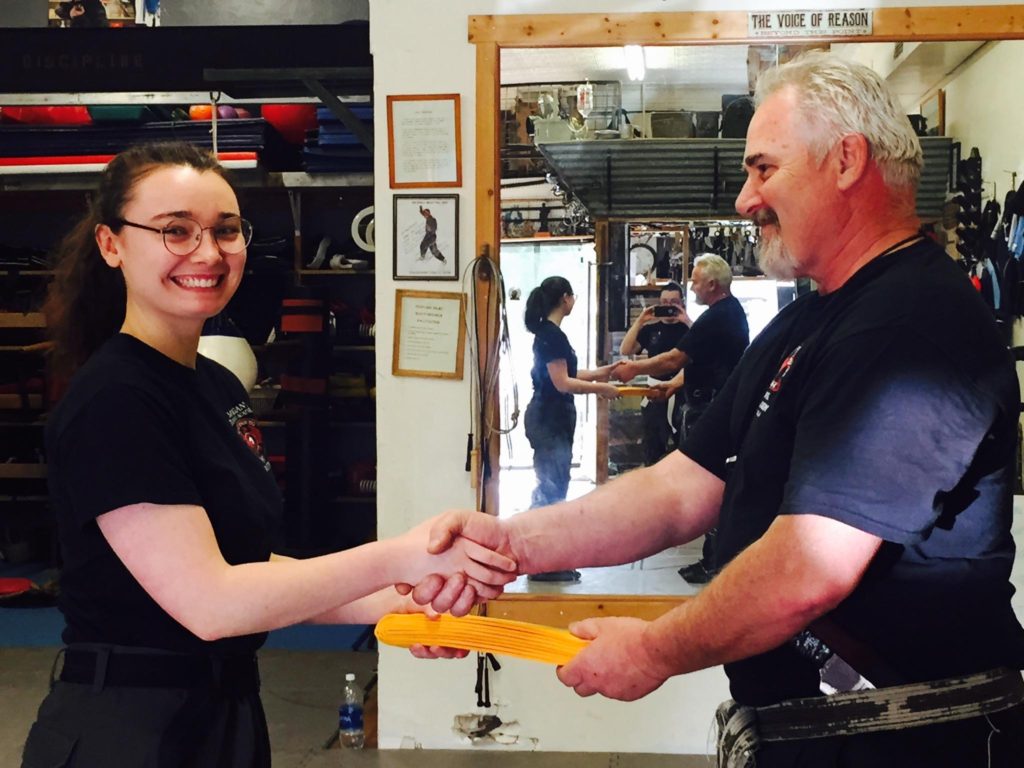
Remember to chip away at your Vision this year.
Here’s a life lesson I learned from my self-defense teacher, Anthony Morgan, “Sifu”, a multi-level blackbelt and a “grandson” of Bruce Lee. (Bruce Lee trained the master who trained Morgan.) My daughter, Kate, and Sifu are pictured above.
Sifu said when he works on a big goal, he thinks about it this way. He has a small pick-axe necklace that reminds him of this principle. He imagines using the little pick-axe to chip away at his goals.
Why does my martial arts teacher use a small pick instead of a big one? Because he will get exhausted if his pickaxe is too big. So, he patiently chips away at his goals a little at a time and doesn’t get overwhelmed or discouraged by the huge-ness of the project. In this way, he has become an expert at self-defense and, as a contractor, has built many houses for clients.
I’m gonna just get it out in the open right now.
The following ideas are the basics which I teach to a time coaching client who has activities he/she would like to make time for. As with anything, knowing the steps is not quite enough. Knowledge is just the first step.
What I mean is, consistently applying these steps on a daily or weekly basis will lead to success in reaching your goals. You need to actually take the steps / do the action, even when you don’t feel like it. That, for me, is always the hardest part in implementing a long-range project.
See my post ‘Is Procrastination holding you back?’ https://efficientspaces.org/procrastination-holding/
“Discipline is the bridge between goals and accomplishments.”
~ Jim Rohn
The third recipe for success: be accountable to someone. A friend, a coach, your spouse, a sibling. Without accountability, most people’s efforts fizzle out after a few months.
I rely on the calls with my business coach, and just knowing that I have to report my progress spurs me to action. To gather my courage to call the newspaper or reach out to the head of HR at a big company—these are hard for me, but I know she’s going to ask me, so that pushes me to make the call.
And on the flip side, when I work with time coaching clients, we set aside time each week for their big picture goal. For many of us, it’s usually just a matter of making the time to do a thing. And being consistent about working on it each day or each week. But that is easier said than done, isn’t it?
See my blog ‘You can do Anything for 30 minutes’ here.

5 Strategies to make time for your goals
YOU CAN DO IT!
What do you want to accomplish or learn? Picture yourself actually achieving this goal. Take several minutes and truly envision what it will be like when you accomplish this amazing thing. Going back to this vision will motivate you to keep chipping away at it when times get tough.
To find a regular time each week that has fewer interruptions, pick a day when you usually get less interruptions or regularly have less going on/ less meetings, less clients and less looming deadlines.
Figure out what time of day is best for you to tackle high-focus or difficult projects. If you work with your preferences, your experience will be much more pleasant. Also, you’ll fit your new activity into the flow of your day naturally. (Are you a Lark or an owl? See the Time Preferences Quiz at the end of the blog.) This will help you reach your vision for the year.
I recommend the same time every day or the same day and time every week. Create a new habit that will get you where you want to go!
For example, say your goal is to complete a course on SEO so you can increase your website referrals. Thursdays at 10 am might be your golden hour.
Use your calendar to remind you daily—especially if you are working on a new habit. I cover habits in depth using the cute and predictable Habit Rabbit to illustrate the best way to create a new habit or break an old habit.
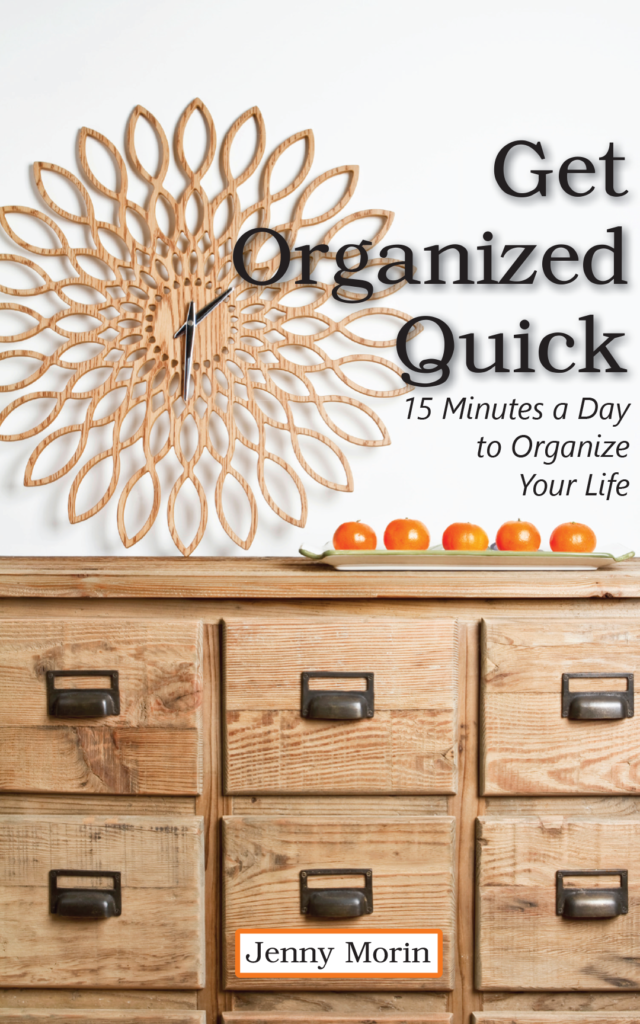
Or, if your plan is to work on your vision for the year on a weekly basis, set a reminder for that in your phone and your work calendar, then treat it like a doctor’s appointment. You wouldn’t cancel a dentist appointment to go to coffee or, read emails, would you?
Did this article help you? Did the questions cause you to think more deeply about your goal and how you’ll actually realize it? Would you benefit by having a coach keep you accountable to your goal?
To find out if coaching is for you, or to schedule a free time management assessment, please head to my website.
Identifying your Energy cycles and sources
Write down your answers to the following questions.
My best time for focus work:
My best time for low-focus tasks:
Thank you for reading, and have a great day!
My blog ‘Goals: Aim for the Stars, Writing Goals you will Stick To’:
